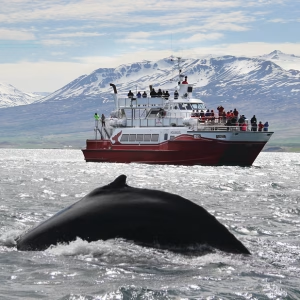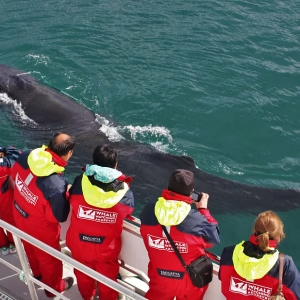Whale Watching Trips in Iceland
Whale Watching Tours in Iceland
Join Unforgettable Whale Watching Trips in Iceland
 The sea is our neighbor, something we greet every morning while scanning for the tell-tale puff of a surfacing whale. Inviting visitors onto a whale-watching boat feels like welcoming friends into our living room because these bays have shaped island life for centuries. Today’s whale-watching trips in Iceland combine that old maritime heritage with responsible tourism, giving you front-row seats to some of the North Atlantic’s most majestic residents.
The sea is our neighbor, something we greet every morning while scanning for the tell-tale puff of a surfacing whale. Inviting visitors onto a whale-watching boat feels like welcoming friends into our living room because these bays have shaped island life for centuries. Today’s whale-watching trips in Iceland combine that old maritime heritage with responsible tourism, giving you front-row seats to some of the North Atlantic’s most majestic residents.
Most tours depart from Reykjavík’s Faxaflói Bay, Akureyri’s sheltered Eyjafjörður, or the little fishing town of Húsavík, often dubbed Europe’s whale-watching capital. Whichever harbor you choose, expect an easy rhythm to the day: friendly crews (many of whom once hauled cod on these very boats) hand out insulated overalls, pour strong coffee, and share local sea lore as the engine hums to life. Within minutes, the city skyline fades, and mountains rise on either side, their snowcaps mirrored in dark, glassy water.
Iceland’s nutrient-rich currents attract a rotating cast of marine giants. Summer brings the acrobatics of humpbacks slapping their tail flukes in the midnight sun while minkes cruise silently alongside white-beaked dolphins. Luckier sailings spot blue whales lumbering through Skjálfandi Bay or pods of orcas slicing through winter swells in the Snæfellsnes Peninsula. Seasoned guides use hydrophones to pick up whale songs, then throttle back the engines so you can hear those deep, otherworldly calls rolling beneath the deck.
Because Icelanders treasure this ecosystem, operators follow a strict code of conduct: engines idle at a respectful distance, approach angles stay gentle, and departures are limited daily. Many tours partner with local marine biologists who collect data on board, so every sighting you log helps protect future generations of whales.
Dress in warm layers and keep your camera ready. The first breach often erupts without warning. When a 40-tonne humpback arcs through Faxaflói’s calm or an orca’s dorsal fin pierces a silvered sea, you’ll feel that unmistakable Icelandic mix of wonder and quiet respect that locals carry home each evening.
From Our Backyard: Insider Tips, Culture & Adventure
How We Will Create Your Lifetime Journey: Best Self-Drive Tours in Iceland and the Faroe Islands
Why Coolcations Are the Future of Travel: Iceland, the Faroe Islands, and Greenland Should Top Your List!
A Local’s Guide to Car Insurance in Iceland: What Every Traveler Should Know
Driving Iceland’s Ring Road: Everything You Need to Know Before You Go
Most Common Questions About Whale Watching Trips in Iceland
When is the best time to go whale watching in Iceland?
Peak whale watching season in Iceland runs from May through September, when humpbacks, minkes, and blue whales follow rich plankton blooms into our coastal fjords. Winter voyages (November–March) still offer good chances to spot orcas and white-beaked dolphins, especially off Snæfellsnes.
Are Reykjavík whale watching tours worth it?
Absolutely. Faxaflói Bay sits on a nutrient-rich shelf that attracts minke whales, harbor porpoises, and the occasional humpback whale, making Reykjavík whale watching perfect for travelers on tight schedules.
Are there eco-friendly whale-watching tours in Iceland?
Can I take photos or videos during the trip?
Yes, DSLRs and phones are fine. Use a fast shutter speed to capture the action, and bring a dry bag to protect your gear from sea spray.
Do whale-watching tours operate in bad weather?
Tours sail in light rain or snow, but strong winds or high swells may trigger cancellations. Operators monitor forecasts constantly and will reschedule or refund if conditions become unsafe.
How far in advance should I book a whale-watching tour in Iceland?
For summer departures out of Húsavík or Reykjavík, secure tickets at least a week ahead; June and July afternoon sailings can sell out. Winter tours usually have more same-day availability.
Which town is considered the best one for whale watching in Iceland?
Húsavík in North Iceland earns that title. The sheltered waters of Skjálfandi Bay provide ideal feeding grounds, giving Húsavík whale watching tours one of the country’s highest success rates for humpbacks and blue whales.
How long does a typical Iceland whale-watching tour last?
Most tours last 2–3 hours from harbour to harbour. Extended “big whale” safaris out of Húsavík or Akureyri can stretch to 4 hours to reach deeper feeding grounds.
What should I wear on a whale-watching boat in Iceland?
Dress in warm layers, windproof outerwear, hat, and gloves even in July. Most companies supply insulated flotation overalls for extra warmth and safety.
How likely am I to see whales on a tour?
Success rates hover around 95% in the summer and 80% in the winter. If no whales appear, many companies offer a free return ticket valid for two years.
Can I see puffins during a whale-watching tour?
From May to mid-August, Atlantic puffins nest on coastal islets and often fly past the boats. Reykjavík and Akureyri operators sometimes combine puffin and whale watching on the same cruise.
Is whale watching in Iceland family-friendly?
Yes. Operators provide child-size flotation suits, secure railings, and heated indoor cabins. Children under seven often sail free or at a reduced rate.
Do Iceland whale-watching boats follow a code of conduct?
Licensed operators adhere to national guidelines, which include slow approach speeds, a minimum distance of 50 meters, and engine idling when whales are nearby. This responsible whale watching protects both marine life and your viewing experience.






